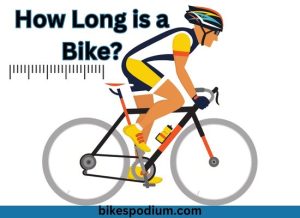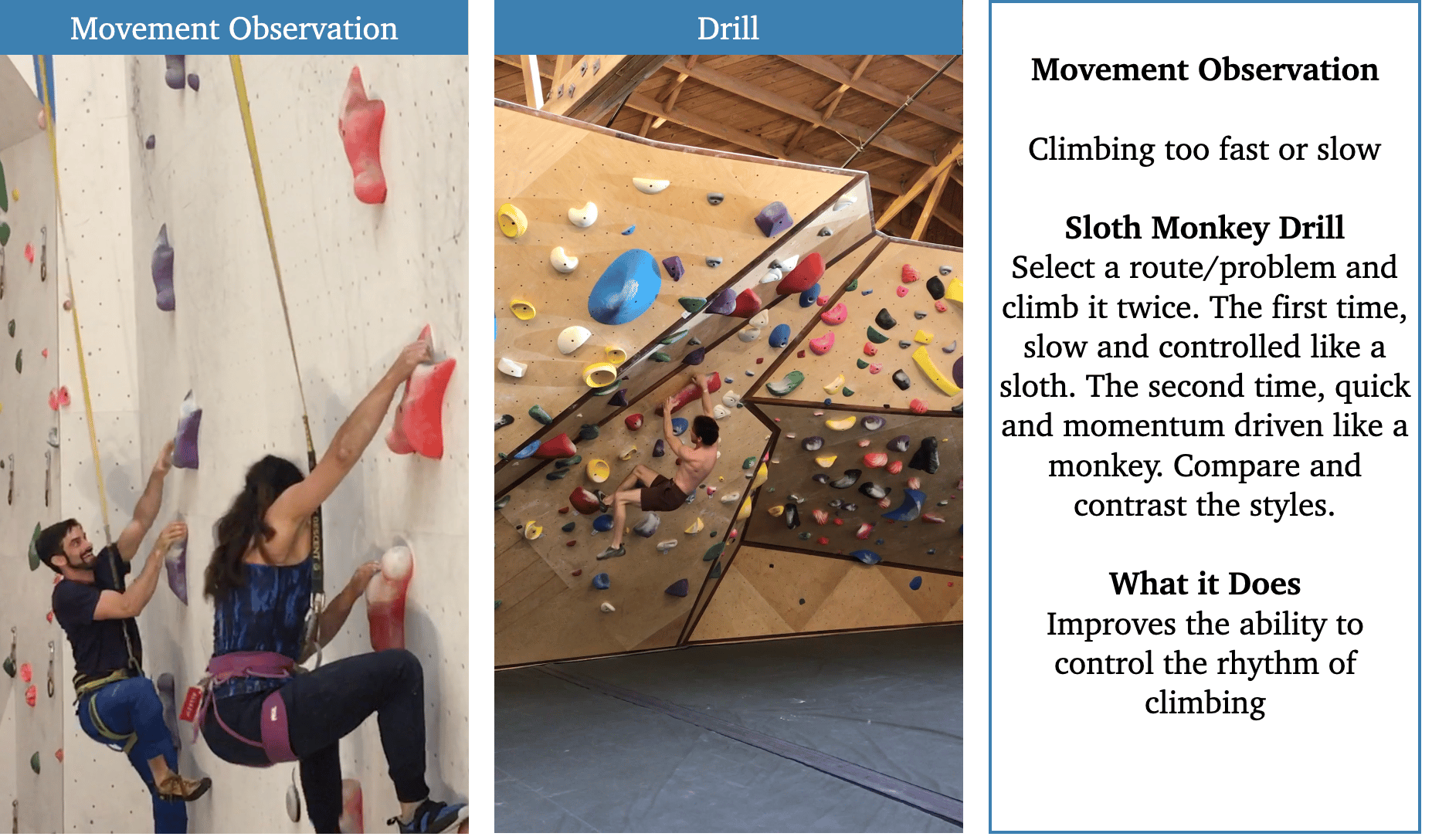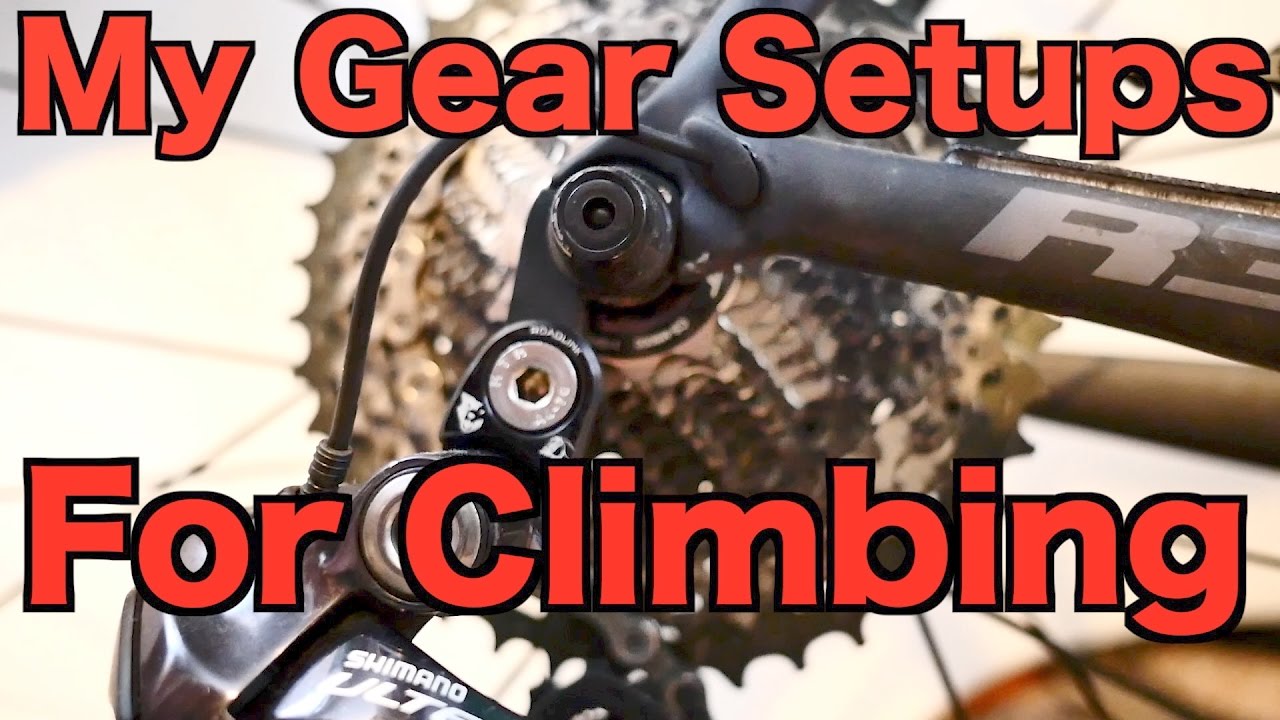🔥 Best MTB GEAR DEALS ON AMAZON

What is the Average Length of a Bike? Understanding Bike Lengths through a Size Chart
If you are looking for the answer to the question ‘how long is a bike’.? You have come to the right place.
Have you ever wondered just how long a bike really is? Well, saddle up as we delve into the nitty-gritty of bike length and its impact on your cycling experience.
Whether you’re a speed demon on the road or a trailblazer in the mountains, understanding the dimensions of your bike is key to achieving the perfect ride.

Also Read:
- The 7 Best Bike Rack for Pop Up Camper 2023: RV Camping Made Easy
- 6 Best Bike Racks for Mazda CX-5: Hitch, No Hitch, Trunk & Roof Mount
- The 5 Best Bike Racks for Subaru: Hitch Roof & Trunk Mount (2023)
Key Dimensions of a Bike
Frame Length
The frame length of a bike is like its backbone – it determines the overall size and fit.
Imagine Goldilocks trying to find the right-sized porridge – too short, and you’ll feel cramped, too long, and you’ll stretch like a rubber band.
The frame length affects your riding posture, comfort, and handling.
Different types of bikes, be it road rockets or rugged mountain beasts, come with varying frame sizes to cater to different body types and riding styles.
Wheelbase Length
Think of the wheelbase as the axle-to-axle distance of your bike (wheelbase is the horizontal distance between the centres of the front and rear wheels). A shorter wheelbase offers nimble maneuverability, perfect for weaving through traffic or tackling technical trails.
On the other hand, a longer wheelbase provides stability, ideal for cruising down open roads or descending steep slopes.
Finding the right balance between these two extremes can greatly influence your bike’s responsiveness and overall ride quality.
Also Read:
- The 5 Best Bike Racks for Rav4: Toyota Rav4 Hitch, No Hitch, Roof Mount & Spare Tire Racks
- Best Bike Rack for Honda CRV 2023 Review
Types of Bikes, Lengths and Size Charts
Road Bikes
In Road Bikes, From frame design to gear ratios, every element plays a crucial role in delivering a seamless and exhilarating riding experience.
Transitioning seamlessly from bustling urban streets to winding country roads, road bikes are built to offer unmatched speed and efficiency.
A key feature that distinguishes road bikes is their drop handlebars, promoting a dynamic and comfortable riding posture.
This positioning not only enhances aerodynamics but also provides multiple hand positions, reducing fatigue during long rides.
Additionally, road bikes boast narrow, high-pressure tires that offer reduced rolling resistance, allowing cyclists to maintain higher speeds with less effort.
Gear selection is a critical aspect of road bikes, with a wide range of ratios tailored to tackle varying terrains.
The incorporation of multiple gears empowers cyclists to conquer steep ascents and achieve exhilarating descents.
Smooth and precise gear shifts are facilitated by advanced drivetrain components, ensuring an uninterrupted flow of power.
As the cycling world evolves, road bikes remain a timeless testament to the fusion of technical innovation and the unbridled joy of the ride.

![How Long is a Bike? [Finding Your Perfect Bike Size]](https://ir-na.amazon-adsystem.com/e/ir?t=bikespodium-20&language=en_US&l=li3&o=1&a=B01N5XTB94)
Road Bikes Size Chart
Mountain Bikes
Welcome to the exhilarating realm of mountain bikes, where rugged terrain meets technical prowess for an adrenaline-fueled adventure like no other.
As enthusiasts explore the great outdoors, delving into the intricacies that define mountain bikes is essential for an optimized and thrilling riding experience.
From suspension systems to tire traction, each element is meticulously designed to conquer the challenges of off-road exploration.
Transitioning seamlessly from rocky trails to steep descents, mountain bikes are engineered to handle the demands of diverse landscapes.
The cornerstone of their design is the robust frame, crafted to withstand the rigors of uneven terrain while offering precise control.
The incorporation of advanced materials ensures durability without compromising agility.
A defining feature of mountain bikes is their suspension system, which mitigates the impact of bumps and obstacles.
Front suspension, known as a “hardtail,” offers improved control and comfort, while full-suspension designs, with both front and rear suspension, deliver enhanced shock absorption for a smoother ride.
This technical innovation allows riders to tackle uneven trails with confidence and finesse.
The choice of tire width and tread pattern is a critical consideration in mountain bike design.
Wider tires with aggressive treads provide superior traction, allowing cyclists to maintain stability on loose or slippery surfaces.
This feature, combined with lower tire pressure, ensures optimal grip and control while navigating challenging terrains.
Whether conquering rocky trails, powering through mud, or navigating technical descents, mountain bikes offer a symphony of strength, durability, and maneuverability.

![How Long is a Bike? [Finding Your Perfect Bike Size]](https://ir-na.amazon-adsystem.com/e/ir?t=bikespodium-20&language=en_US&l=li3&o=1&a=B08239TZWY)
Mountain Bikes Size Chart
Also Read:
- Merax FT323 Mountain Bike Review: 24 Speed MTB With 26″ Tire
- Gravity Fsx Mountain Bike Review: Gravity Fsx 1.0 Full Suspension Bike
- Can You Put Pegs on a Mountain Bike? Unraveling the Pegs Mystery!
Hybrid Bikes
Hybrid bikes, the Swiss Army knives of the cycling world, strike a balance between road and mountain bikes.
With a frame length that falls somewhere in between, hybrids offer a comfortable upright riding position while maintaining decent speed capabilities.
Whether you’re commuting through city streets or embarking on weekend adventures, a hybrid’s versatile dimensions ensure a smooth and adaptable ride.

![How Long is a Bike? [Finding Your Perfect Bike Size]](https://ir-na.amazon-adsystem.com/e/ir?t=bikespodium-20&language=en_US&l=li3&o=1&a=B00GM1MMF2)
Hybrid Bikes Size Chart
BMX Bikes
BMX Bikes are compact yet robust bikes are purpose-built for stunts, jumps, and lightning-fast maneuvers, making them a favorite among thrill-seekers and adrenaline junkies.
With their small, sturdy frames crafted from high-tensile steel or lightweight chromoly, BMX bikes offer exceptional strength while enabling nimble control.
The single-gear drivetrain maximizes power transfer, allowing riders to unleash explosive bursts of speed and execute jaw-dropping tricks with ease.
BMX bikes come in various styles, each catering to specific disciplines.

Freestyle BMX Bikes
Freestyle BMX bikes feature a durable build and versatile geometry, ideal for conquering ramps, rails, and urban landscapes.
BMX Racing Bikes
On the other hand, prioritize speed and agility, boasting smaller frames and knobby tires designed for navigating high-speed tracks and challenging obstacles.
These bikes also showcase distinctive features, such as knobby tires that grip surfaces for tight turns and rapid accelerations.
The handlebars, known as “bars,” vary in shape and size, enabling riders to fine-tune their control and balance.
Unlike traditional bikes, BMX models often lack suspension systems, promoting direct rider-terrain interaction for precise handling.
Whether you’re captivated by the artistry of freestyle tricks or drawn to the adrenaline of racing, BMX bikes offer an unparalleled thrill.
As you dive into this world, you’ll uncover the craftsmanship behind these remarkable machines, designed to amplify your skills and elevate your riding experience.
So, grab your helmet, strap in, and prepare to embark on an unforgettable journey through the realm of BMX bikes – where innovation and athleticism collide in a whirlwind of excitement.
BMX Bikes Size Chart
Kids Bikes
Tailored to captivate young imaginations, these pint-sized bicycles are carefully crafted for comfort, safety, and the pure joy of riding.
From vibrant colors to whimsical designs, kids’ bikes are more than just modes of transportation, they’re vehicles of boundless fun and cherished memories.
With sturdy frames, responsive brakes, and training wheels for those early pedaling steps, these bikes are the perfect companions for kids eager to discover the thrill of independence.
As children pedal along sidewalks, parks, and driveways, each ride becomes an adventure, teaching balance, coordination, and a lifelong love for the open road.

Kids Bikes Size Chart
Time Trial (TT) & Triathlon Bikes
Time Trial (TT) and Triathlon bikes are designed for speed.
Step into the realm of precision engineering and aerodynamic mastery with time trial (TT) bikes.
These cutting-edge marvels are purpose-built to slice through the air with minimal resistance, making them the ultimate choice for against-the-clock races.
TT bikes represent the pinnacle of cycling technology, meticulously designed to maximize speed, efficiency, and performance.
At the heart of a TT bike lies its streamlined frame geometry, meticulously crafted to reduce wind drag and enhance aerodynamics.
The frame’s unique shape, often characterized by elongated tubes and deep-section aero profiles, allows riders to cut through the air like a well-honed blade.
Every curve, angle, and contour is carefully calculated to minimize turbulence and optimize forward momentum.
Innovative components, such as integrated handlebars, aero brake calipers, and hidden cabling, further contribute to the bike’s sleek and efficient design.
These features not only enhance the bike’s aerodynamic profile but also reduce wind resistance, allowing riders to maintain higher speeds while expending less energy.
TT bikes often feature a forward-leaning riding position, achieved through specialized saddle and handlebar placement.
As you delve into the world of TT bikes, you’ll discover a symphony of technology, design, and performance optimization.

![How Long is a Bike? [Finding Your Perfect Bike Size]](https://ir-na.amazon-adsystem.com/e/ir?t=bikespodium-20&language=en_US&l=li3&o=1&a=B09BR2YRV3)
Triathlon Bikes
Triathlon bikes are purpose-built to conquer the challenges of multisport racing, seamlessly transitioning between swimming, cycling, and running.
With aerodynamic designs, specialized features, and a focus on optimal performance, these bikes are the go-to choice for athletes seeking to excel in the demanding world of triathlons.
Triathlon bikes are engineered for speed and efficiency, combining elements of road and time trial (TT) bikes.
Their frames are meticulously crafted to slice through the wind, reducing drag and allowing athletes to maintain higher speeds with less effort.
Integrated components, such as aero handlebars, optimized brake systems, and hidden cabling, further streamline the bike’s profile, minimizing turbulence and maximizing aerodynamic advantage.
As you embark on your journey into the realm of triathlon bikes, you’ll discover a realm of technological innovation and athletic excellence.
These bikes are not merely tools, they’re the embodiment of dedication, training, and the pursuit of peak performance.
TT/Triathlon Bikes Size Chart
Electric Bike
Electric bikes, commonly referred to as e-bikes, are bicycles equipped with an integrated electric motor and a rechargeable battery system.
The electric motor, situated either in the bike’s hub or frame, provides varying degrees of assistance to the rider’s pedaling efforts.
This assistance can be adjusted through different power modes to accommodate terrain and riding preferences.
The rechargeable battery pack, typically mounted on the downtube or rear rack, supplies the necessary energy for the electric motor.
Lithium-ion batteries are the standard choice due to their high energy density, lightweight characteristics, and extended lifespan.
E-bikes function in two primary modes pedal-assist (PAS) and throttle.
In PAS mode, the electric motor engages when the rider pedals, delivering power proportionate to the pedal input.
Throttle mode, on the other hand, allows the rider to control the motor’s power output using a handlebar-mounted throttle.
A control display unit is often integrated into the e-bike’s handlebars.
This console provides essential information such as current speed, distance traveled, remaining battery level, and power mode selection.
Some e-bikes offer additional features like smartphone connectivity for navigation and fitness tracking.
E-bikes are designed in various configurations to suit different riding styles.
City e-bikes are optimized for urban commuting, while mountain e-bikes feature robust components for off-road exploration.
Hybrid e-bikes provide a versatile option for a mix of terrain and uses.
E-bikes contribute to sustainable transportation and promote active lifestyles, making them a viable option for a wide range of cyclists.

![How Long is a Bike? [Finding Your Perfect Bike Size]](https://ir-na.amazon-adsystem.com/e/ir?t=bikespodium-20&language=en_US&l=li3&o=1&a=B07SGFFFP2)
Electric Bike Size Chart
Sizing and Fit
Importance of Proper Bicycle Sizing
Much like Cinderella’s glass slipper, the right bike size can make all the difference.
A bike that fits you perfectly ensures optimal power transfer, minimizes strain on your body, and reduces the risk of discomfort or injury. It’s not just about riding – it’s about riding comfortably and efficiently.
Finding the Right Bike Size
To find your ideal bike size, consider your height and inseam measurement. Most manufacturers provide sizing charts that correlate these measurements with specific frame sizes.
It’s a bit like finding your constellation in the night sky – once you know what to look for, you’ll be able to choose a bike that aligns perfectly with your dimensions.
Professional Bike Fitting
For a truly tailor-made experience, investing in a professional bike fitting is worth its weight in gold.
Bike fitting experts take into account not only frame length but also other factors like saddle height, handlebar reach, and pedal positioning.
It’s like having a personal bike whisperer who fine-tunes every aspect of your ride to perfection.
Factors Influencing Bike Length
Riding Style and Preference
Your style sets the stage – whether you’re a leisurely cruiser, a competitive racer, or an adventurous explorer. Different riding styles call for different bike lengths.
A longer bike might be your speed demon’s chariot, while a slightly shorter one could be your trail conqueror.
Terrain and Conditions
Nature plays its part too. The terrain you tackle influences the ideal bike length.
A longer frame might excel on open roads, while a shorter one could prove invaluable on twisty trails.
Consider your playground, whether it’s smooth pavement or rocky paths, and let it guide your choice.
Conclusion
As we conclude our journey into the realm of bike lengths, remember that understanding these dimensions isn’t just about technicalities, it’s about enhancing your cycling experience.
Armed with this newfound knowledge, you’re equipped to make an informed decision when selecting your next two-wheeled companion.
So, whether you’re aiming for podium finishes, seeking mountain thrills, or cruising through city streets, may your bike’s length be perfectly attuned to your style, terrain, and aspirations. Happy riding!



